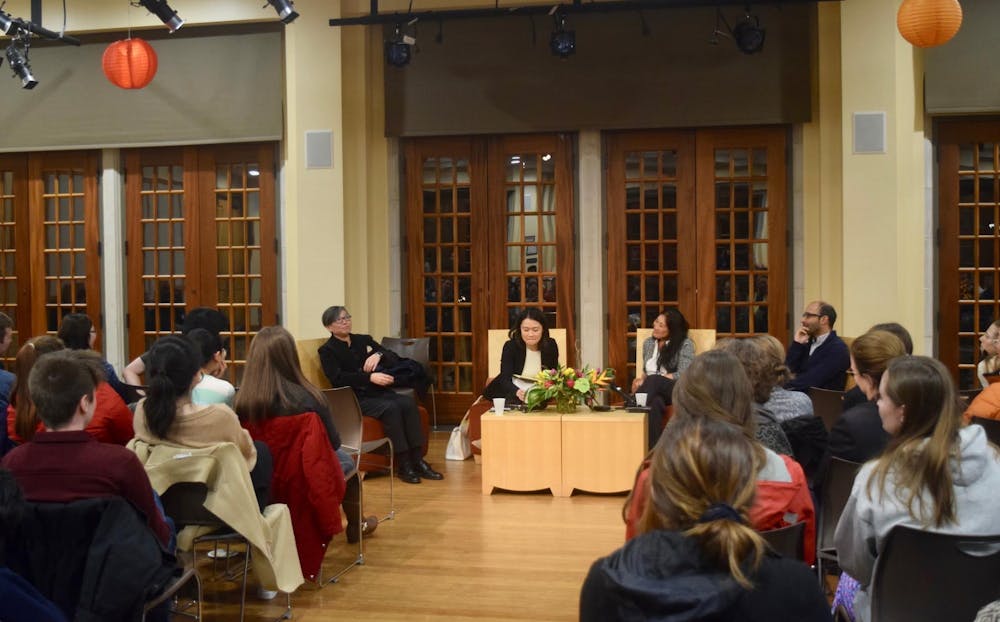During a student-requested panel on Tuesday, Nov. 12, three Asian-American professors discussed what it is like to be Asian during "Asia Week" on a predominantly white campus.
Political science professor Dan Chen mediated the panel, which was composed of journalism professor Shahan Mufti, history and global studies professor Tze Loo and political science professor Jennifer Erkulwater.
Chen began the talk by discussing tokenism and how she and many minority professors, students and faculty members are constantly made to be the representatives of their community.
This comment moved the conversation onto how Asia week, in a way, has been used as a token — a short collection of days meant to cover an entire continent.
In past years, the Office of International Education has curated International Education Week by focusing on countries such as South Africa and Denmark. Students were unsettled by the office’s decision to focus this year’s event on Asia, a continent containing 48 countries.
The Office of International Education decided to split Asia Week into two years, with this year focusing on East Asia and next year on South Asia. While the panelists believed this decision was a step in the right direction, they still expressed that discussions about identity in regions of Asia and even individual countries can be very complex.
There was a general discomfort among the panel about the term “Asian American,” citing that it was too broad of a classification.
“I just can’t identify with a continent, a whole freaking continent!” said Erkulwater, a political science professor of Filipino and Thai descent.
Loo agreed that the term was not an accurate description of how she identified herself. She found that “an overseas Chinese person” was a more fitting identifier for her since she was born and raised outside of the United States.
Mufti, author of “The Faithful Scribe,” discussed how “Asian-American” means something very different in the U.S. than it does in the rest of the world. Most Americans use the term to mean someone of East Asian descent, whereas people in the United Kingdom would use it to refer to someone of South Asian descent, he said.
Mufti also mentioned the difficulty of identifying people by their country because of how diverse the country itself could be. He used his family’s home country of Pakistan as an example, explaining how casters for the new “Ms. Marvel” movie plan on finding a Pakistani woman for a lead role.
“Pakistani is not a racial identity,” Mufti said. “There are tons of racial groups in Pakistan.”
Enjoy what you're reading?
Signup for our newsletter
The country’s demographic is too broad to try and cast a “Pakistani girl” because that could mean many things, he said.
Loo and Erkulwater discussed their struggles between their different identities growing up. Erkulwater’s parents did not teach her a third language because they did not want her to have an accent. They also gave her a common American name out of fear that she would be judged by her peers, she said.
In contrast, Loo’s parents were afraid that she would lose her Chinese identity and forget the language when she moved to the U.S.
“There was this assumption that…America was such a frightening solvent that it could somehow dilute or make things that were so intrinsic to me somehow become less,” Loo said.
The panelists also noted that the celebration of diversity could sometimes lead to “othering,” or separating the celebrated minorities from white-dominated spaces.
Erkulwater said that events such as Asia week reminded her that she was not truly American in the eyes of the country’s citizens.
“Calling for an undoing of ‘othering,’ means calling for an undoing of past structures of power,” Loo said. “Unless we are willing to acknowledge that and call it out for what it is, then can we think about what it means not to ‘other’ other people?”
Each professor agreed that celebrations of diversity like Asia Week will be effective only if white-dominated institutions confront the issue of race and give students, staff members and faculty members a say in these events.
The panel concluded with a student asking how UR planned on making next year’s Asia week better, considering that they have more time to plan for it.
Dean of International Education Martha Merritt, who was in attendance, answered that the ultimate goal was to sit down with students to discuss what they wanted to see and get their opinions on what would be the most effective way to celebrate these cultures.
“It’s been a very challenging two months but I think what’s happening this week is infinitely better because students came to us,” Merritt said.
Senior Kidest Gebre said that she had appreciated UR’s efforts.
“It was nice to see that the university actually listened to the students,” Gebre said. “There’s still a lot of issues but we wouldn’t be sitting here having this conversation without this panel.”
Contact contributor Jada Frazier at jada.frazier@richmond.edu.
Support independent student media
You can make a tax-deductible donation by clicking the button below, which takes you to our secure PayPal account. The page is set up to receive contributions in whatever amount you designate. We look forward to using the money we raise to further our mission of providing honest and accurate information to students, faculty, staff, alumni and others in the general public.
Donate Now



